Questions arise on promissory note deferral

The breaking news that there is an imminent deal on the payment of €3.1 billion due on 31 March on Anglo promissory notes, deferring payment until 2025, seems welcome but we need to see terms and conditions. First the interest rate that will apply, second, what does this mean for the remaining €29 billion promissory notes? Then, will this remain on the books in the calculation of the national debt, requiring us to reduce the dept to 60 per cent of GDP by 2015, which will retain an enormous strain on the public finances.
Karl Whelan, professor of economics at UCD, who has studied the promissory note issue, is tweeting that he doesn't believe there will be a deal tomorrow – he says "credible sources" have got this wrong before.
On the ESM issue, there are a few curiosities.
First, the ESM Treaty was renegotiated and signed on 2 February last, and the new version included what is now called "the blackmail" clause – that if we don't approve the Fiscal Treaty, we will not be eligible to get future bail-out funding via the ESM (the new mechanism to rescue EU States in financial trouble). So, why did the Irish government agree to the change, given that (a) it knew at the time there was a possibility the Fiscal Treaty would require ratification by referendum (the referendum was announced later); and (b) it knew there was a possibility the people would vote against the Fiscal Treaty?
And, secondly, in order to permit the establishment of the ESM mechanism, there had to be a change to the existing EU Treaties and this was "agreed" at the European Council meeting on 16 December 2010.
This was an amendment Article 136 of The Treaty on the Functioning of the European Union (this is an amalgam of some of the EU Treaties, all ratified in Ireland by way of referendum), which simply added a clause stating: "The member states whose currency if the euro may establish a stability mechanism to be activated, if indispensable to safeguard the stability of the euro areas as a whole. The granting of financial assistance under the mechanism will be made subject to strict conditionality".
How this could be legal in Ireland is difficult to understand. Any change to an EU Treaty is, for us, a constitutional issue, requiring ratification by the people in a referendum.
[View the story "Promissory Note #vinb discussion" on Storify]
Image top: infomatique.
